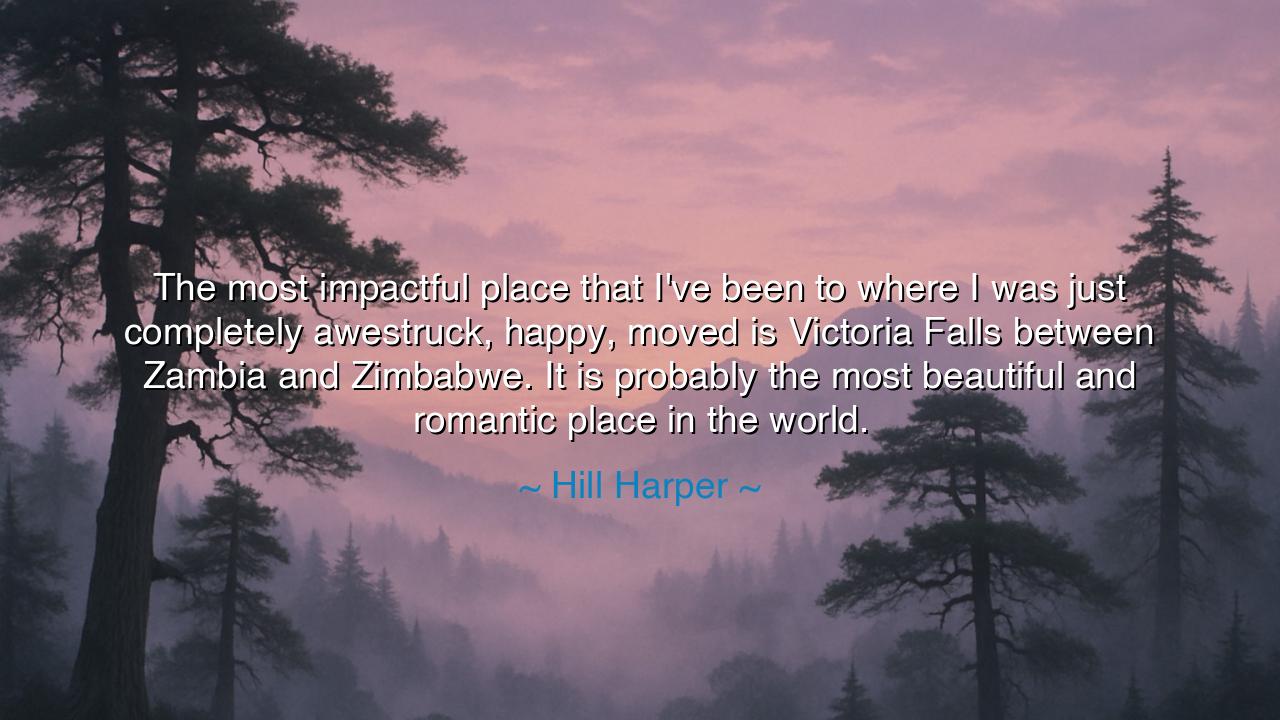
The most impactful place that I've been to where I was just
The most impactful place that I've been to where I was just completely awestruck, happy, moved is Victoria Falls between Zambia and Zimbabwe. It is probably the most beautiful and romantic place in the world.






The words of Hill Harper—“The most impactful place that I've been to where I was just completely awestruck, happy, moved is Victoria Falls between Zambia and Zimbabwe. It is probably the most beautiful and romantic place in the world”—resound like a hymn to the majesty of creation. In them, we hear the reverence of a soul struck silent by grandeur, the astonishment of a traveler who has stood at the edge of one of nature’s most overwhelming wonders. To call Victoria Falls not only beautiful but romantic is to acknowledge that its power lies not merely in spectacle, but in the way it stirs the deepest affections of the human heart.
The origin of this vision rests in humanity’s ancient awe before the natural world. Long before cities were built, men and women gazed at mountains, seas, and waterfalls as manifestations of the divine. To the indigenous people of that land, the Falls were known as Mosi-oa-Tunya, “The Smoke That Thunders,” a name that captures both their might and their mystery. It was not only a sight to behold, but a living symbol of life itself—water descending in endless abundance, mist rising like incense, thunder echoing like the voice of heaven. Harper’s words align with this ancient reverence: to stand before such a sight is to be humbled, uplifted, and transformed all at once.
History gives us echoes of this same reverence. When David Livingstone, the Scottish missionary and explorer, first laid European eyes upon the Falls in 1855, he declared that scenes so lovely must have been gazed upon by angels in their flight. And though his words reflected the language of his time, they also reveal what Harper speaks of: that the Falls transcend ordinary categories of description. They are not simply scenic; they are overwhelming, filling the soul with a sense of the eternal, awakening the feeling we call romantic, which is the union of awe and love.
But Harper does not stop at beauty—he speaks of being awestruck, happy, moved. These are not the emotions of a tourist, but of a pilgrim. To be awestruck is to be silenced by something greater than yourself. To be happy is to feel one’s heart rise in unison with that greatness. To be moved is to feel the soul reshaped, forever carrying the memory of that encounter. In these words, Harper points us toward a truth: that certain places do more than delight the eye—they awaken the spirit, and leave us different than we were before.
The lesson is this: seek out the places, the experiences, the encounters that leave you awestruck. For in them, you will find not only joy, but transformation. Do not confine romance to candlelight and roses; find it also in roaring waters, in towering cliffs, in the sweep of the stars above. Romance is not only between two souls—it is between the human spirit and the majesty of the world it inhabits.
Practically, this means making space in your life for encounters with the sublime. Travel, if you can, to places that awaken reverence. If travel is beyond your reach, then seek the waterfalls, mountains, forests, or oceans near you. Even in smaller measure, nature holds the same power to move. Stand before it not as a passerby, but as a worshipper. Let its greatness strip away your trivial worries, and remind you of the vastness of which you are a part.
Thus, Harper’s declaration is more than praise for a waterfall. It is a teaching: that the most beautiful and romantic places are those that awaken both humility and joy. They remind us of the grandeur of existence and the tenderness of the human heart, bound together in awe.
And so let this truth be handed down: when you find yourself before beauty so great that words fail, let it move you, let it shape you, let it teach you. For in such moments, you are closer to the eternal, and in such places, the soul remembers its kinship with the divine. Victoria Falls is not only water and rock—it is the song of the world’s heart, thundering with love.






AAdministratorAdministrator
Welcome, honored guests. Please leave a comment, we will respond soon